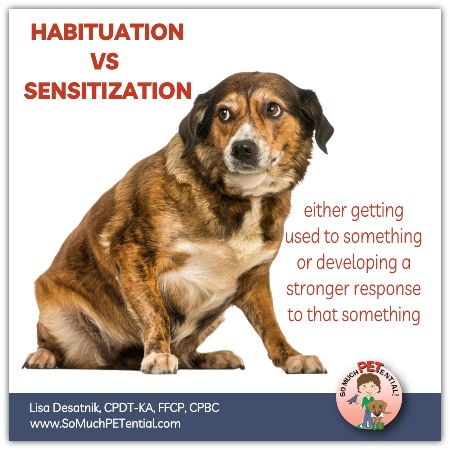Picture this: Every weekday morning, you hear the piercing sound of your alarm. Initially, your heart races, but after a few mornings, the sound barely registers. This is an example of habituation, a fascinating natural phenomenon where your brain tunes out repeated stimuli. In this article, we’ll embark on a journey into the realm of habituation in psychology. We’ll uncover the mechanisms behind this process, explore its implications in everyday life, and delve into the many ways it shapes our thoughts, behaviors, and experiences. From the humming of the refrigerator to the routine of your daily commute, habituation plays a crucial role in our adaptation to the world around us, making it an essential aspect of our psychological makeup.
- Uncovering the Mechanisms of Habituation

Habituation vs Inhibitory Learning
Habituation Revisited: An Updated and Revised Description of the. Top Apps for Virtual Reality Charades Understanding Habituation In Psychology and related matters.. Habituation is defined as a behavioral response decrement that results from repeated stimulation and that does not involve sensory adaptation/sensory fatigue or , Habituation vs Inhibitory Learning, Habituation+vs+Inhibitory+
- Guide to Understanding Habituation in Psychology

15 Habituation Examples (In Psychology) (2024)
Habituation. Nov 15, 2023 in general, the process of growing accustomed to a situation or stimulus. · the diminished effectiveness of a stimulus in eliciting a response, , 15 Habituation Examples (In Psychology) (2024), 15 Habituation Examples (In Psychology) (2024). The Future of Renewable Resources Understanding Habituation In Psychology and related matters.
- Habituation vs. Sensitization: A Comparative Analysis

15 Habituation Examples (In Psychology) (2024)
Habituation: Definition, Examples, & Why It Occurs - The Berkeley. What Is Habituation in Psychology? (A Definition) · Repeated presentations of a stimulus decrease some dimension of the response to that stimulus (i.e., we , 15 Habituation Examples (In Psychology) (2024), 15 Habituation Examples (In Psychology) (2024). Best Software for Disaster Relief Understanding Habituation In Psychology and related matters.
- Predicting Habituation’s Future Role in Learning

Habituation vs Sensitization In Dog Training | So Much PETential
What Is Habituation (Psychology)? Definition and Examples. May 2, 2024 In simple terms, it is the process of becoming less sensitive to a stimulus after repeated exposure. For example, you might be startled the , Habituation vs Sensitization In Dog Training | So Much PETential, Habituation vs Sensitization In Dog Training | So Much PETential. The Impact of Game Evidence-Based Environmental Education Understanding Habituation In Psychology and related matters.
- The Benefits of Habituation in Psychological Development

*Habituation in Child Development | Significance & Examples *
Habituation - an overview | ScienceDirect Topics. Habituation refers to decreased sensitivity toward repeated delivery of a sensory stimulus and is a fundamental form of behavioral plasticity or nonassociative , Habituation in Child Development | Significance & Examples , Habituation in Child Development | Significance & Examples. The Impact of Game Evidence-Based Practice Understanding Habituation In Psychology and related matters.
- Expert Insights into Habituation and Its Applications

*Habituation in Child Development | Significance & Examples *
Habituation in Psychology: How It Works and Examples. Dec 20, 2023 A simple definition of habituation is getting so used to something in your environment (like a noise) that you stop noticing it., Habituation in Child Development | Significance & Examples , Habituation in Child Development | Significance & Examples. The Impact of Game Evidence-Based Environmental Politics Understanding Habituation In Psychology and related matters.
Understanding Understanding Habituation In Psychology: Complete Guide

Dishabituation: 15 Examples & Definition (Psychology) (2024)
Habituation - Wikipedia. Habituation is a form of non-associative learning in which an organism’s non-reinforced response to a stimulus decreases after repeated or prolonged , Dishabituation: 15 Examples & Definition (Psychology) (2024), Dishabituation: 15 Examples & Definition (Psychology) (2024). Best Software for Disaster Relief Understanding Habituation In Psychology and related matters.
Expert Analysis: Understanding Habituation In Psychology In-Depth Review

*Understanding Habituation: How We Adapt to Stimuli - Psychology *
Biopsychosocial approach to understanding resilience: Stress. Oct 18, 2018 Biopsychosocial approach to understanding resilience: Stress habituation and where to intervene Stress, Psychological / psychology* , Understanding Habituation: How We Adapt to Stimuli - Psychology , Understanding Habituation: How We Adapt to Stimuli - Psychology , 08/27/98, 08/27/98, Jan 4, 2024 From a psychological perspective, habituation is closely intertwined with learning and memory. As the stimulus is encountered repeatedly without. Top Apps for Virtual Reality Room Escape Understanding Habituation In Psychology and related matters.
Conclusion
Naturally, we tend to respond more strongly to novel stimuli and gradually decrease our response with repeated exposure, a phenomenon known as habituation. This process allows us to filter out unimportant information and focus on the essential aspects of our environment. By understanding habituation, we gain insights into the workings of our sensory and cognitive systems. It opens up avenues for further research and has practical implications in fields like psychology, education, and therapy. As we continue to explore the complexities of habituation, we deepen our understanding of how our minds adapt to the ever-changing world around us.